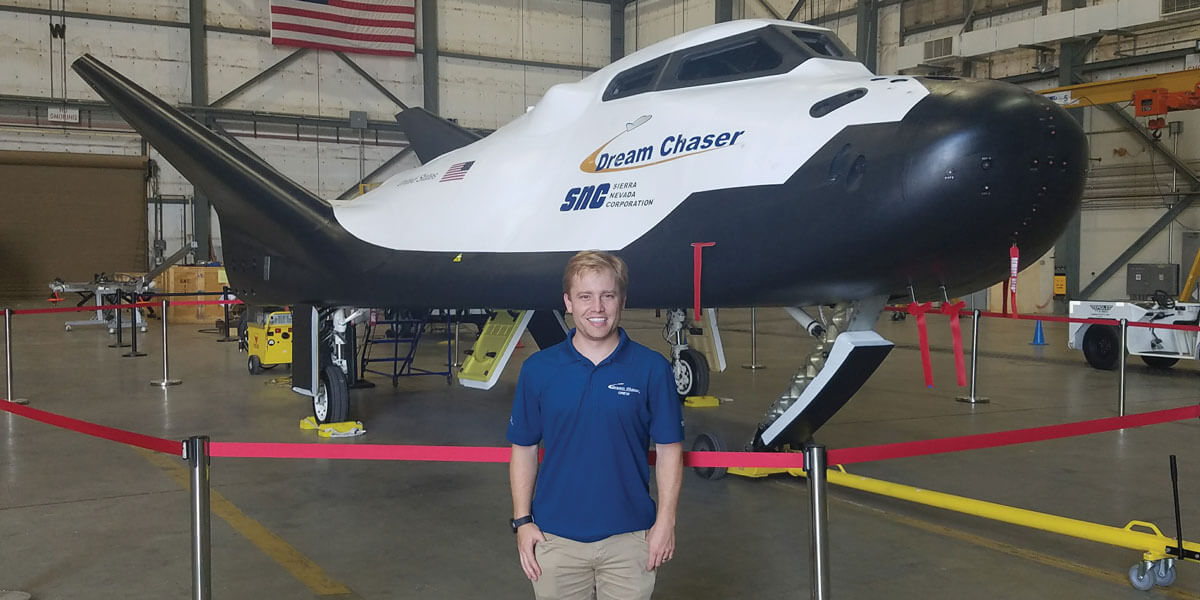To put it mildly, Alec Devereaux ’07 likes ambitious projects. The mechanical engineer from Evergreen, Colo., designs rockets.
He currently works for Blue Origin—the business undertaking of Amazon Founder and President Jeff Bezos—where the company mission includes “millions of people living and working in space.” Before that, he worked on creating a space plane as part of the Dream Chaser project at Sierra Nevada Corporation Space Systems in Louisville, Colo.
“I want to challenge what people think of as the space industry,” he says. “And I want to challenge myself and push the next frontier.”
When your job really is rocket science
While space travel is not new, the goal now is to make that possible for many, many more people, including those without formal training. Devereaux and his colleagues at Blue Origin are creating reusable launch vehicles to reduce costs and make space travel more accessible.
As Systems Engineering Manager on the Test and Flight Operations team, Devereaux designs engine test stands and launch sites. The sites include the launch pad the rocket sits on, the fueling systems, and the towers the astronauts go up in to enter the spacecraft.
He and the rest of the over 2,5000-strong Blue Origin staff are currently working on two rocket-powered space capsules (named for the first American astronauts to achieve sub-orbital and orbital space flight): the New Shepard, which lets people experience suborbital space travel after a single day of training; and the New Glenn, which will “build a road to space” with its capacity for carrying people and freight to Earth orbit and beyond.
When the space capsules launch, only a small group of space travelers and rocket scientists will be on site. Devereaux may not be one of them, but he knows that he and his colleagues will stop work in their labs and huddle together in teams to watch the big event.
“[During space launches,] I always feel a sense of extreme nervousness, but also confidence,” he says. “As soon as that thing launches, it’s exuberance and excitement.”
What happens when you put a banana in liquid nitrogen
For the successful launch of his career in engineering and aeronautics, Devereaux feels excitement and gratitude—to Colorado Academy which he attended from Fifth to Twelfth Grade.
“Starting at CA with a group of supportive science teachers and college counselors has ultimately led me to my dream job,” he says.
With CA’s STEM support and resources, he wasn’t surprised when, shortly after moving to Seattle in January, he discovered that classmate and fellow engineer Colin Patterson ’07 also works for Blue Origin.
Devereaux remembers performing science experiments in CA’s well-appointed STEM labs and going to space camp for an Interim program in Middle School. He feels grateful for science faculty members whose classes had a big impact on him. And he has clear memories of a CA chemistry teacher demonstrating the properties of liquid nitrogen by putting a banana in it. The fruit froze so solid that the students could smash it into pieces.
“I loved high school at CA,” he says. “The support that the CA community provides professionally and emotionally is phenomenal.”
The difference between a vacation itinerary and a space rocket launch plan
Like most big, long-term goals, sending humans to live in space requires a lot of organization and planning. This has allowed Devereaux to tap into a skill some of his CA classmates may remember in him: event planning.
“I was known among my friends as a cruise director,” he says. “I was always planning parties and weekend getaways. I’d create spreadsheets for who was bringing what and riding in which car.”
Instead of birthday bashes and road trips, he’s now applying his organization and detail management skills to planning the creation, week by week, of space rocket launch stands.
“I can make something huge and massive into something tangible,” he says. “It’s a matter of figuring out how you go from ‘millions in space’ to ‘what am I doing on Monday?’”
So, how many more Mondays before there will be real human space cities?
“It will take a while for us to get there, but we’re always looking toward the horizon,” Devereaux says. “I believe in the next 50 years, thousands will be up there.”
In the meantime, Devereaux’s shorter-term, but no less ambitious, project is a joint venture: Mae Harper Devereaux was born on October 9, 2020.
